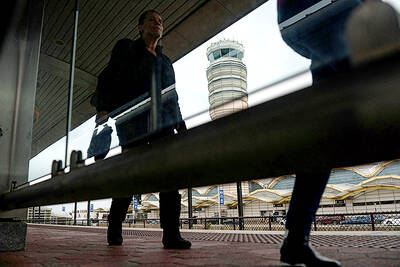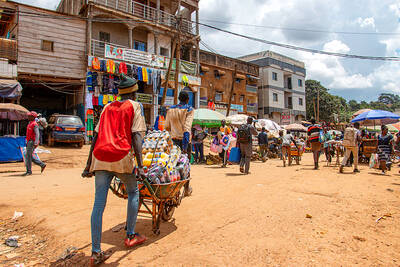Diplomats from six major powers were to meet yesterday to discuss whether Iran should face new UN sanctions for refusing to halt sensitive nuclear work, but Western envoys said China’s decision to send a low-level official ruled out a quick deal.
The meeting comes after Tehran ignored last year’s deadline set by US President Barack Obama for Iran to respond to an offer from the US, the UK, France, Germany, Russia and China of economic and political incentives in exchange for halting its nuclear program.
Five of the six nations that made the offer were sending senior foreign ministry officials — so-called political directors — to the meeting.
However, China decided not to send its political director. Instead, Beijing was expected to send a low-level diplomat from its UN mission, diplomats in New York said.
“We’re expecting a political expert from the Chinese mission who won’t have any decision-making authority,” a diplomat said on condition of anonymity.
China’s virtual snub of the six-power meeting has caused consternation among the four Western powers in the group, which had hoped to use yesterday’s meeting to reach an agreement on whether to begin drafting a new Security Council resolution on a fourth round of UN sanctions against Tehran.
Diplomats said they did not know China’s motive, speculating it might be to illustrate Beijing’s resistance to punishing Iran with more sanctions or dismay at US arms sales to Taiwan.
“There’s not much point in having the meeting in light of the Chinese representation, but we’re going to have it,” a diplomat from one of the six countries said. “We need to send a message to Iran that we’re not dropping this issue.”
“I wouldn’t expect a particular deliverable out of this meeting,” US State Department spokesman P.J. Crowley told reporters on Friday.
Washington and its Western allies accuse Iran of trying to develop nuclear weapons under the cover of its civilian atomic program. Iran says its atomic program is designed to generate electricity so it can export more of its valuable oil and gas.
The US and European delegations believe Iran has had enough time to respond to what they describe as a generous offer to Tehran, but China’s UN envoy, Zhang Yesui (張業遂), said on Jan. 5 it was not “the right time or right moment for sanctions because the diplomatic efforts are still going on.”
The process of negotiating a new sanctions resolution will most likely take months, Western diplomats said.
US and other Western officials have said privately that Russia is “on board” for a new round of sanctions, but several Western diplomats voiced skepticism the Russians would support tough measures against the Iranians.
Existing UN sanctions target Iran’s nuclear and missile industries. The Western powers had originally hoped to sanction Iran’s energy sector, but they dropped the idea months ago when it became clear Russia and China would never accept it.
In order to secure Beijing’s and Moscow’s support, Western diplomats said they would probably be willing to accept a less ambitious resolution that adds a few new names of Iranian individuals and firms to a UN blacklist and focuses some attention on Iran’s Revolutionary Guard corps.
They said Russia would probably back such a resolution, but it was not clear if they could get the backing of Beijing, a veto-wielding permanent Security Council member like Russia, the US, Britain and France.
China and Russia, which have lucrative commercial ties with Tehran, supported all three previous rounds of UN sanctions but lobbied hard to dilute the measures before they were voted on by the 15-nation Security Council.

FRUSTRATIONS: One in seven youths in China and Indonesia are unemployed, and many in the region are stuck in low-productivity jobs, the World Bank said Young people across Asia are struggling to find good jobs, with many stuck in low-productivity work that the World Bank said could strain social stability as frustrations fuel a global wave of youth-led protests. The bank highlighted a persistent gap between younger and more experienced workers across several Asian economies in a regional economic update released yesterday, noting that one in seven young people in China and Indonesia are unemployed. The share of people now vulnerable to falling into poverty is now larger than the middle class in most countries, it said. “The employment rate is generally high, but the young struggle to

ENERGY SHIFT: A report by Ember suggests it is possible for the world to wean off polluting sources of power, such as coal and gas, even as demand for electricity surges Worldwide solar and wind power generation has outpaced electricity demand this year, and for the first time on record, renewable energies combined generated more power than coal, a new analysis said. Global solar generation grew by a record 31 percent in the first half of the year, while wind generation grew 7.7 percent, according to the report by the energy think tank Ember, which was released after midnight yesterday. Solar and wind generation combined grew by more than 400 terawatt hours, which was more than the increase in overall global demand during the same period, it said. The findings suggest it is

IN THE AIR: With no compromise on the budget in sight, more air traffic controllers are calling in sick, which has led to an estimated 13,000 flight delays, the FAA said Concerns over flight delays and missed paychecks due to the US government shutdown escalated on Wednesday, as senators rejected yet another bid to end the standoff. Democrats voted for a sixth time to block a Republican stopgap funding measure to reopen government departments, keeping much of the federal workforce home or working without pay. With the shutdown in its eighth day, lines at airports were expected to grow amid increased absenteeism among security and safety staff at some of the country’s busiest hubs. Air traffic controllers — seen as “essential” public servants — are kept at work during government shutdowns, but higher numbers

Elvis Nghobo tried to get into four different professional schools in Cameroon, but could not make it. Frustrated, the 34-year-old turned to selling food at a market in Yaounde, the country’s seat of power. Nghobo blames his woes on what he calls a corrupt education system that favors children of the elite. As the central African country prepares for Sunday’s presidential election, he said he would not be heading out to vote. He called the results a foregone conclusion for 92-year-old Paul Biya, the world’s oldest president, who has ruled for Nghobo’s entire life. “He is already too old to govern, and it’s boring